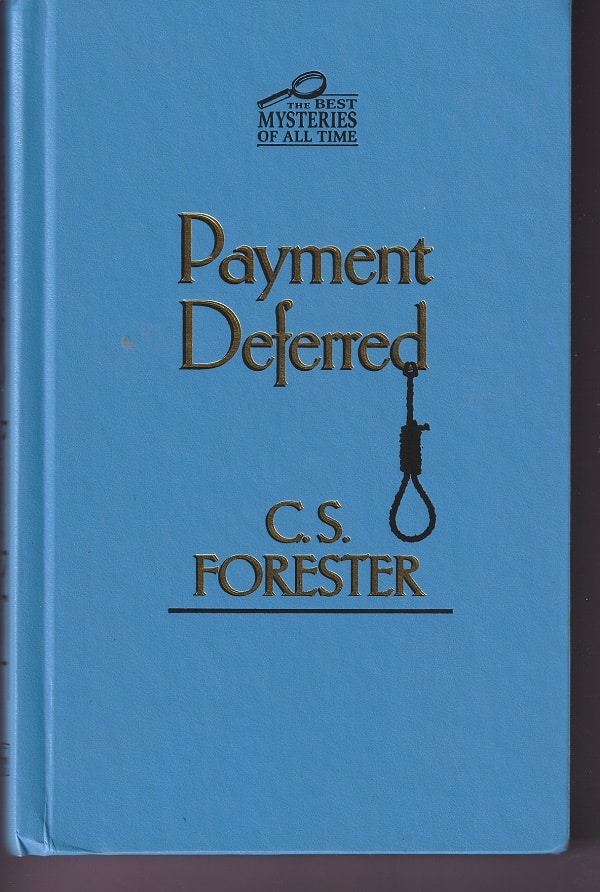The tone of C.S. Forester’s 1926 novel Payment Deferred is distinctively light and breezy.
Think of the way a great storyteller sitting at a campfire might spin a tale about the actions and events of the usual American sitcom family, circa late 20th century.
What we have here is the blundering, buffoonish father of the family, William Marble, a low-level bank official who is in over his head with debts. That’s partly due to his flighty birdbrain of a wife, Annie, who can’t stay within a budget because it’s all too confusing.
There are two kids — John, 14, and Winnie, 13 — who, as is usual in such settings, seem more mature and level-headed than their parents.
And, when a young, rich relative from Australia, Jim Medland, arrives for a visit, everything seems ready for a laff riot.
Then, the murder takes place.

Problems
I’m not giving anything away since the whole of the book hinges on this very early occurrence — although it must be acknowledged that Annie, with her deep spaciness, doesn’t figure out the truth until three-quarters of the way through the 207-page novel.
Of course, Winnie never comprehends what’s happened although she’s the family member who most benefits, and neither does John although he does stumble upon another deep, dark secret to his great disadvantage.
Marble is a small man afflicted with smallness of mind who, in a moment of great avarice, poisons Medland for a handful of money in his wallet — enough to stave off the debt-collectors and, later, to finance a killing in the money markets of the day.
Indeed, he comes away with more than 27,000 British pounds, or the equivalent today of $2.3 million.
So, the killing solves his money problems. But doesn’t solve his problems.
Psychological and dark
His biggest problem is his terror that Medland’s body, buried in the home’s neglected garden, will be discovered by the cops, and he will be convicted by a judge and be hanged by the neck until he is dead.
In its way, Payment Deferred is a psychological thriller. An example in literature is Edgar Allan Poe’s story “The Tell-Tale Heart” in which the narrator-murderer’s killing of his roommate ultimately drives him mad.
Payment Deferred, however, isn’t just a psychological thriller. It’s also a dark comedy in which a very serious subject, in this case, murder, is made light of.
For instance, Fargo, an often hilarious film about a pregnant cop investigating a kidnapping and various murders and the disposal of a body with a woodchipper, is a dark comedy. So is Inglorious Basterds during which Nazis are deeply terrifying at some points but the butt of a lot of laughs at others.
The sitcom tone that Forester uses makes Marble out to be a fool and a ditherer despite his heinous killing of his relative in cold blood.
As Marble’s life goes more and more out of control because of his terrors, the narrator isn’t portentous and foreboding the way Poe is in “The Tell-Tale Heart.” Instead, he’s jaunty and peppy in relating each plot turn, including that last one which is an irony of ironies.
But that’s a spoiler I won’t share.
Patrick T. Reardon
2.28.23
Written by : Patrick T. Reardon
For more than three decades Patrick T. Reardon was an urban affairs writer, a feature writer, a columnist, and an editor for the Chicago Tribune. In 2000 he was one of a team of 50 staff members who won a Pulitzer Prize for explanatory reporting. Now a freelance writer and poet, he has contributed chapters to several books and is the author of Faith Stripped to Its Essence. His website is https://patricktreardon.com/.
